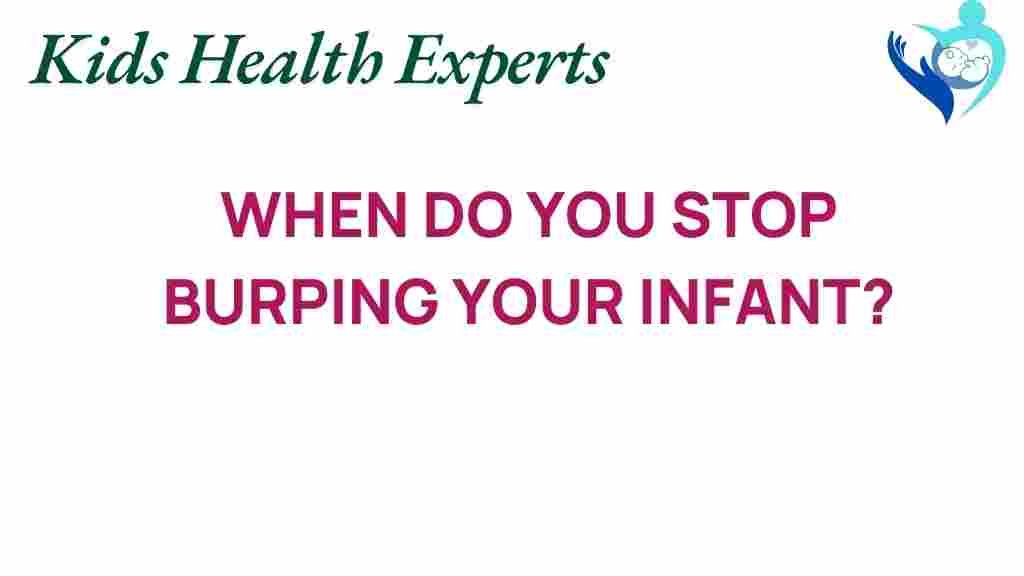Unraveling the Mystery: When Should You Stop Burping Your Infant?
As a new parent, understanding your baby’s needs can often feel overwhelming. One of the many tasks that come with infant care is burping. While it’s commonly accepted that burping is essential for preventing discomfort during and after feeding, many parents find themselves wondering: when should you stop burping your infant? In this article, we’ll explore the importance of burping, guidelines for when to start and stop, and tips for managing burping during baby feeding. We’ll also address colic relief and offer pediatric advice to help you navigate the early days of newborn care.
The Importance of Burping
Burping is a natural process that helps release air that infants swallow during feeding. Swallowing air can lead to discomfort, fussiness, and even colic in babies. Understanding the importance of burping is crucial for effective infant care.
- Prevents Discomfort: By releasing trapped air, burping can help alleviate gas and discomfort.
- Promotes Better Feeding: A burped baby is likely to feed more comfortably and efficiently.
- Reduces Colic Symptoms: Proper burping may help reduce the frequency and severity of colic episodes.
When to Start Burping Your Infant
Typically, you should start burping your infant right from their first feeding. It’s a practice that can be integrated into the feeding routine as soon as you bring your baby home. Here are some key points to remember:
- Burp your baby after every ounce of milk consumed, especially in the early weeks.
- If your baby is bottle-fed, consider burping them halfway through the bottle and again at the end.
- Breastfed infants should be burped when switching breasts or after about 10 minutes of feeding.
When to Stop Burping Your Infant
Knowing when to stop burping your infant can be just as important as knowing when to start. Most babies will naturally outgrow the need for frequent burping by the time they reach 4 to 6 months of age. However, there are signs to look for:
- Age: By 4 to 6 months, many infants develop better control over their swallowing and are less likely to swallow excess air.
- Feeding Style: If your baby is exclusively breastfeeding and seems comfortable, they may not need to be burped as frequently.
- Signs of Comfort: If your baby shows no signs of discomfort or fussiness post-feeding, you may reduce burping.
How to Burp Your Infant
Burping your infant can be done in several ways. Here are some effective methods:
- Over the Shoulder: Hold your baby upright against your shoulder, supporting their bottom with one hand. Gently pat or rub their back with the other hand.
- Sitting Up: Sit your baby on your lap, supporting their chin and chest with one hand. Use the other hand to gently pat their back.
- Laying on the Lap: Lay your baby face down on your lap, ensuring their head is higher than their chest. Pat or rub their back while keeping a watchful eye on their comfort.
Common Challenges and Troubleshooting Tips
Burping can sometimes be challenging, especially if your baby is fussy or resistant. Here are some troubleshooting tips:
- Fussiness: If your baby is overly fussy during burping, try changing positions or taking a break before continuing.
- No Burp: If your baby doesn’t burp after a few minutes, it’s okay to stop. Not all babies need to burp after every feeding.
- Colic Relief: If your baby struggles with colic, consider consulting your pediatrician for tailored advice and techniques.
Pediatric Advice on Burping
Always consult your pediatrician for personalized guidance on burping and feeding practices. Pediatric advice can help alleviate concerns and ensure your baby is comfortable and healthy. For more information, visit HealthyChildren.org, a trusted resource for parents.
Baby Feeding and Burping: A Balanced Approach
When it comes to baby feeding, a balanced approach is key. Here are some parenting tips to keep in mind:
- Feed in an Upright Position: Keeping your baby in an upright position during feeding can minimize the amount of air they swallow.
- Choose the Right Bottle: If bottle feeding, consider using anti-colic bottles designed to reduce air intake.
- Monitor Feeding Cues: Pay attention to your baby’s hunger and fullness cues, which can help reduce the risk of swallowing air.
Conclusion
Burping is a crucial aspect of infant care that can significantly impact your baby’s comfort during and after feeding. While it’s essential to start burping early on, knowing when to stop is equally important. As your baby grows and develops, their need for burping will change. Always be attentive to their cues and consult your pediatrician for advice tailored to your unique situation. By following these parenting tips, you can ensure a smoother feeding experience for both you and your baby.
For more information on newborn care and feeding practices, check out our related articles on parenting resources.
This article is in the category Care and created by KidsHealthExperts Team

1 thought on “Unraveling the Mystery: When Should You Stop Burping Your Infant?”